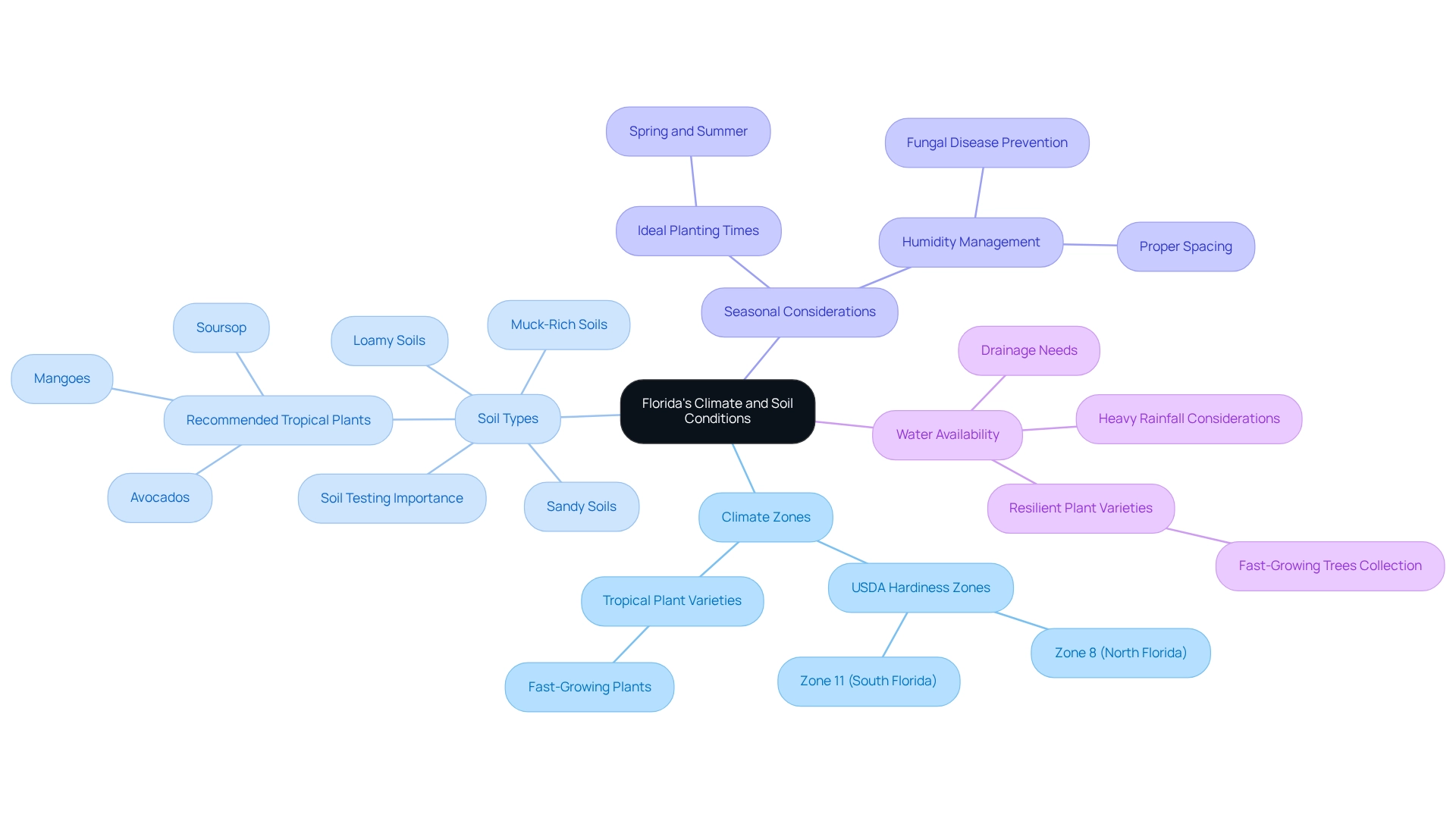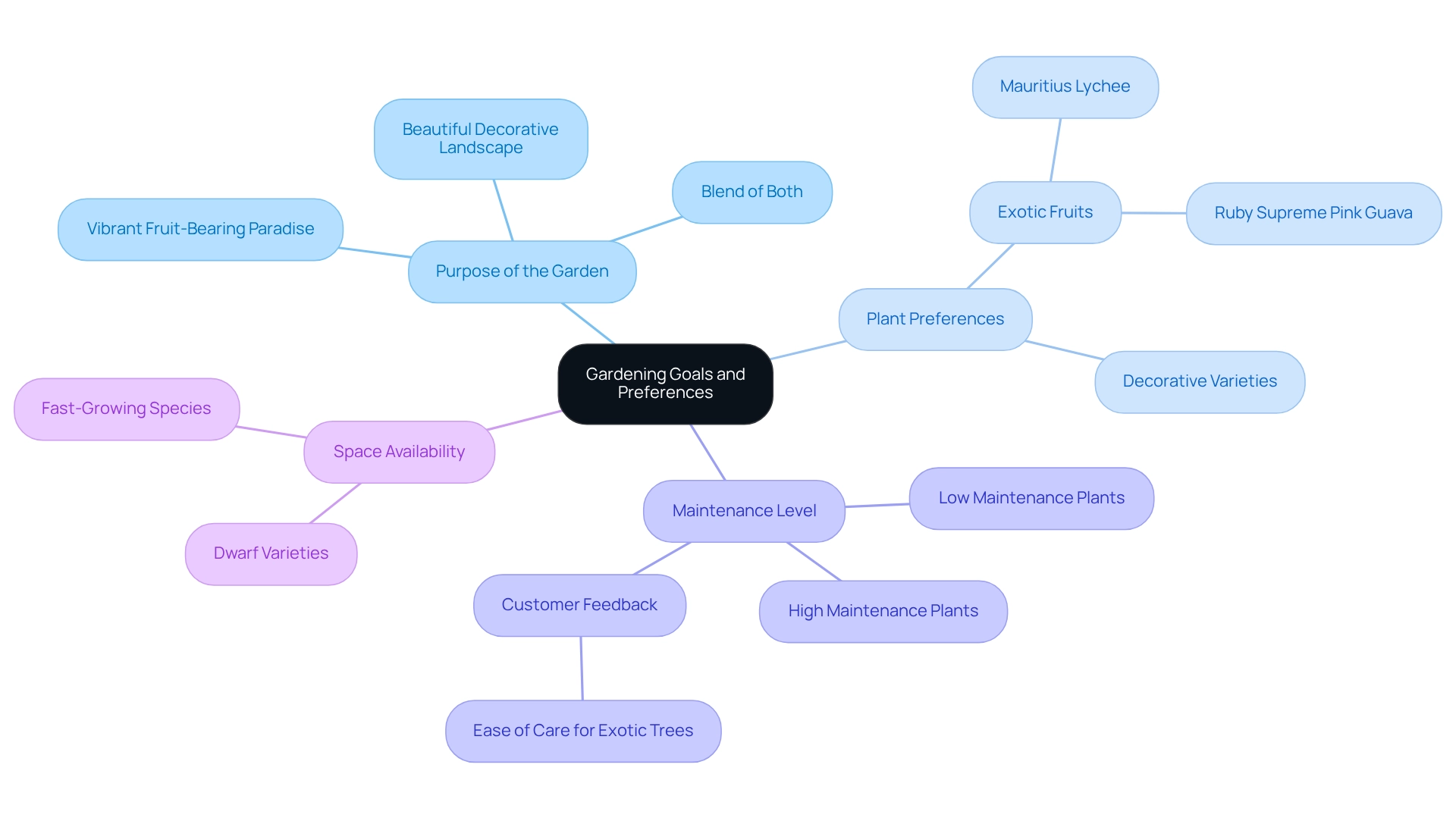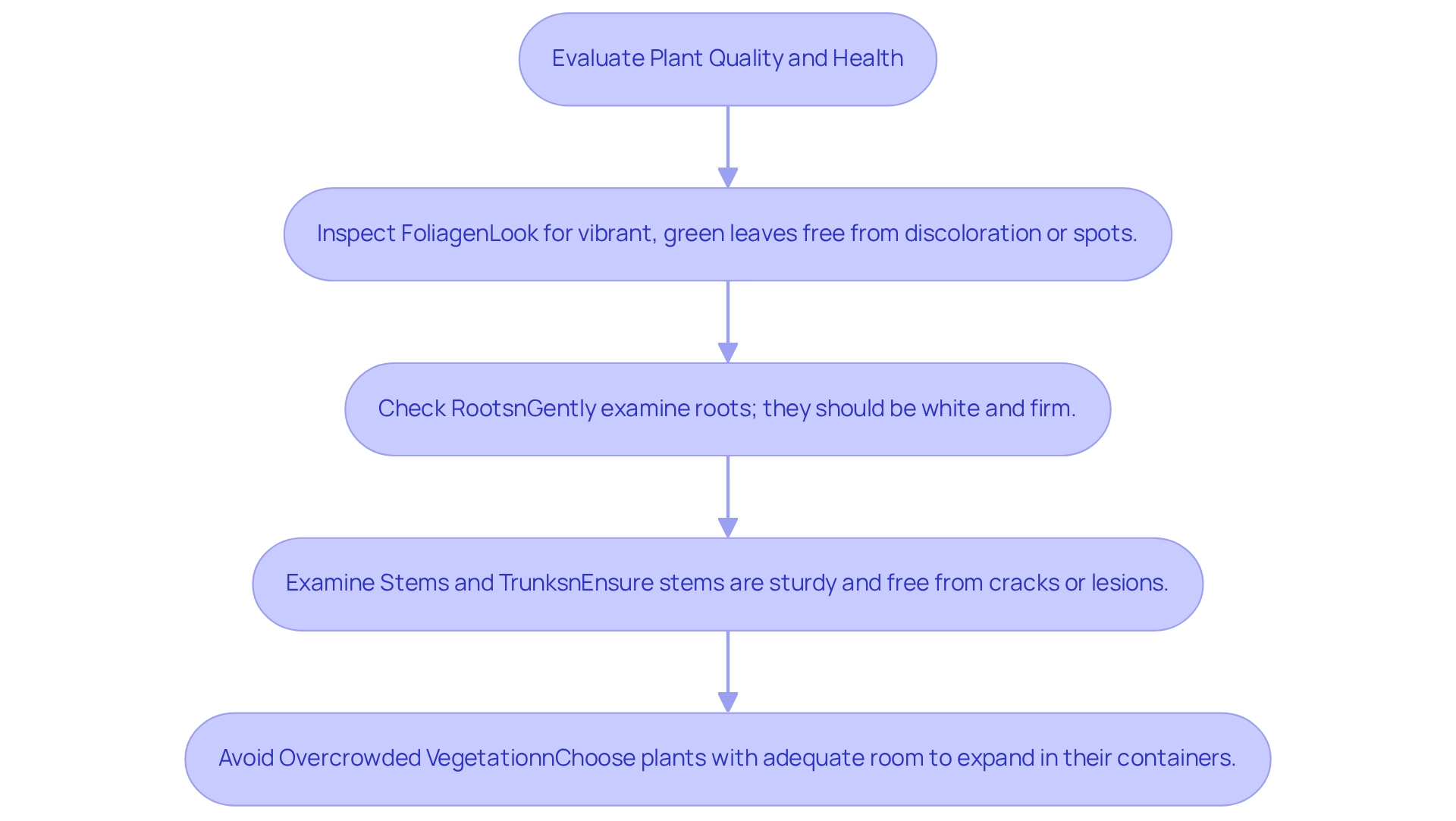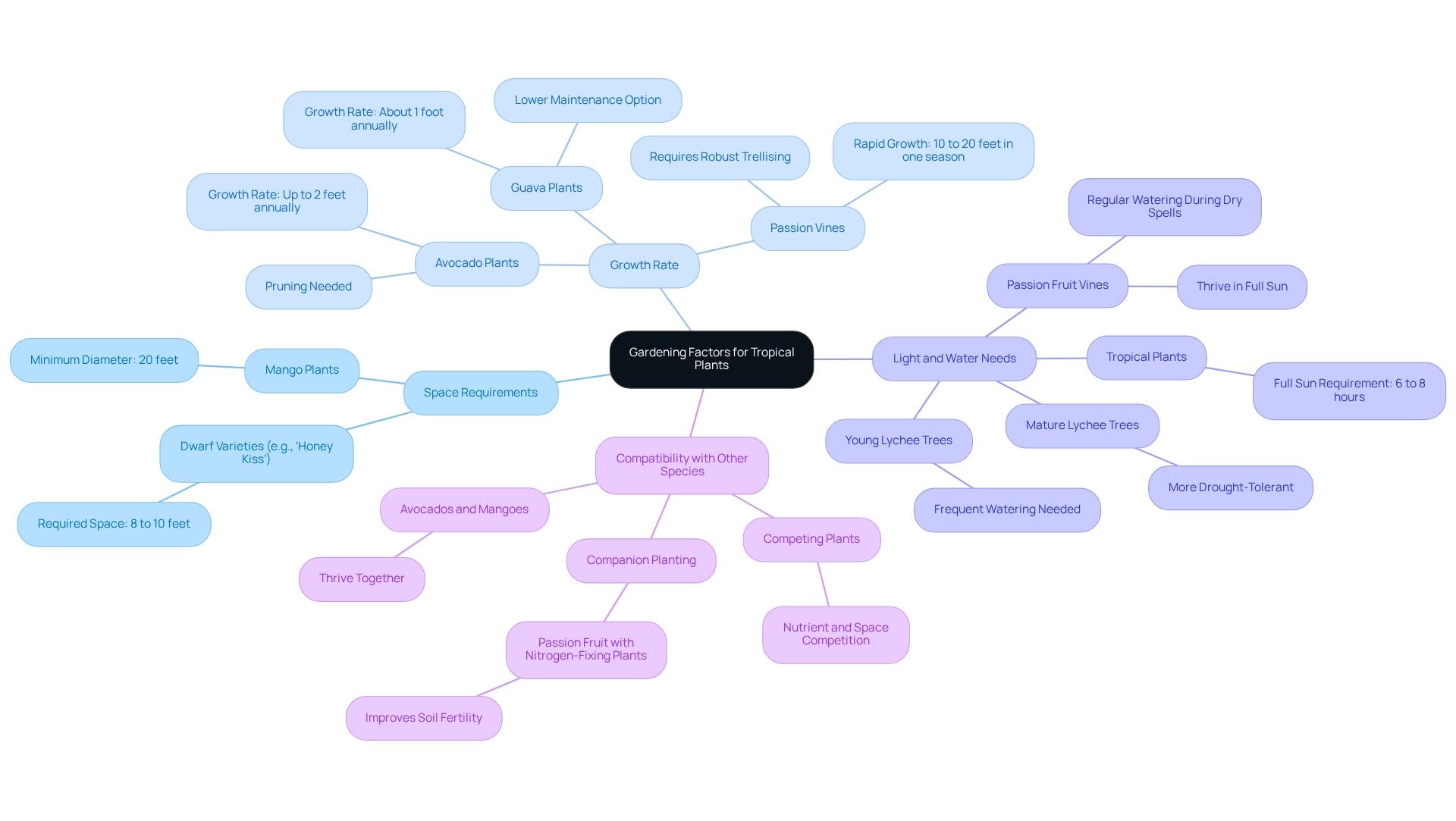
Essential Steps for Choosing Plants at a Homestead Nursery Florida
Share
Choosing plants at a homestead nursery in Florida can feel overwhelming, especially with the unique challenges of local climate and soil conditions. But don't worry—by considering your gardening goals and the health of the plants, you can make informed choices that lead to a flourishing garden. It's vital to understand Florida's distinct environment, as well as your personal preferences, to ensure that your selections truly resonate with your gardening journey.
Imagine walking through a nursery, feeling the warmth of the sun and the gentle breeze. You might wonder, 'What will thrive here?' This article aims to guide you through that process, offering insights that address your concerns and aspirations. By embracing the beauty of Florida's landscape and aligning it with your gardening dreams, you can cultivate not just plants, but a thriving sanctuary.
As you embark on this journey, remember that every gardener faces challenges. Whether it's selecting the right species or nurturing them to health, you're not alone. With a little patience and understanding of your surroundings, you can create a garden that reflects your heart and hard work. So, let's explore these considerations together, ensuring that your garden flourishes with love and care.
Introduction
Florida's lush landscapes and warm climate offer a nurturing backdrop for cultivating a vibrant garden filled with tropical fruit trees. Yet, successful gardening in this unique environment requires more than just enthusiasm; it calls for an understanding of the state's diverse climate zones, soil conditions, and seasonal patterns.
As you embark on your gardening journey, it’s essential to:
- Define your goals
- Evaluate plant quality
- Consider the specific needs of your chosen varieties
By exploring these vital aspects, you can transform your outdoor space into a fruitful oasis that enhances your home and nurtures a deep connection to nature.
So, let’s delve into the intricacies of Florida gardening together and discover how to cultivate a thriving paradise right in your backyard.
1. Understand Florida's Climate and Soil Conditions
Florida's climate is characterized by a warm, humid subtropical environment, making it essential for us as gardeners to understand our local conditions when selecting the right plants. Here are some key factors to consider:
- Climate Zones: To start, it's vital to identify your specific USDA hardiness zone. This will help us understand the varieties of greenery that can thrive in our area. Florida ranges from zone 8 in the northern regions to zone 11 in the south, allowing us to explore a wide variety of tropical plants. For instance, Everglades Farm's
- Fast-Growing Plants collection offers options designed for quick growth and abundant harvests, perfect for our gardens.
- Soil Types: Our state boasts a variety of soil types, including sandy, loamy, and muck-rich soils. Conducting a soil test is a great way to evaluate pH and nutrient levels, guiding our plant choices. Tropical plants like mangoes, avocados, and soursop flourish in well-drained, slightly acidic soils, making soil testing an essential step in our planting journey. As Erblin Berisha wisely advises, "Use mulch to insulate roots and conserve warmth," helping us maintain optimal soil conditions. Moreover, the Fast-Growing Trees collection includes varieties that are particularly suited for Florida's soil types, ensuring better adaptability and growth.
- Seasonal Considerations: Understanding Florida's growing seasons is crucial for our gardening success. The ideal time to cultivate tropical fruit trees, such as passion fruit and soursop from Everglades Farm, is during the spring and summer months when soil temperatures are warm and moisture levels are elevated, promoting healthy root development. However, we should also be mindful of the challenges posed by Florida's humid climate. A case study on managing humidity and plant health highlights that proper spacing can reduce the risk of fungal diseases, which is vital for maintaining healthy growth. Key findings indicate that adequate spacing enhances air circulation and decreases moisture retention around the foliage, minimizing disease risk.
- Water Availability: With Florida's heavy rainfall, we must consider the water needs of our plants. While some exotic plants can tolerate waterlogged conditions, ensuring proper drainage is essential to prevent root rot and other moisture-related issues. The Fast-Growing Trees collection features varieties that are more resilient to fluctuating water levels, making them ideal for Florida's variable climate.
By considering these factors, we can make informed choices that enhance the growth and health of our fruit trees at our homestead nursery Florida, ultimately leading to a productive and vibrant garden. Let's explore Everglades Farm's Fast-Growing Trees collection for quick-yield tropical greenery that can thrive in Florida's unique environment.

2. Define Your Gardening Goals and Preferences
Before visiting a homestead nursery in Florida, it’s essential to clearly define your gardening goals to ensure a successful planting experience.
- Purpose of the Garden: What do you envision for your garden? Is it a vibrant fruit-bearing paradise, a beautiful decorative landscape, or perhaps a blend of both? This clarity will guide your selections effectively.
- Plant Preferences: Think about the types of plants that resonate with you. Are you drawn to exotic fruits like guavas and lychees, or do you prefer decorative varieties? Your personal tastes will significantly influence your gardening choices. Everglades Farm, a homestead nursery Florida, offers a delightful range of exotic fruit plants, including the popular Mauritius lychee and Ruby Supreme pink guava, which have received enthusiastic feedback from satisfied customers. With a customer satisfaction rate of 79%, you can feel confident in your choice.
- Maintenance Level: Reflect on the amount of time you can realistically dedicate to garden upkeep. Some plants require more care than others, so it’s crucial to choose varieties that align with your lifestyle for lasting joy. Many customers have praised the ease of care for the exotic trees purchased from the homestead nursery Florida, making them a wonderful option for both novice and experienced gardeners.
- Space Availability: Consider the planting space you have at your disposal. For those with limited areas, dwarf varieties or fast-growing species from homestead nursery Florida can be perfect, allowing you to maximize your garden's potential without overcrowding.
In 2025, gardening goals among Florida homeowners indicate a growing preference for tropical fruits, with many eager to enhance their outdoor spaces with vibrant, fruitful species. This trend underscores the importance of aligning your selections with your gardening dreams. As C. Z. Guest wisely noted, a garden can be a loyal friend, providing joy and fulfillment as you nurture it. Furthermore, as Mahatma Gandhi insightfully stated, neglecting to tend the soil is akin to neglecting ourselves, highlighting the personal connection we cultivate through gardening.
By defining your gardening goals and preferences, you lay the groundwork for a flourishing home garden that reflects your unique style and needs. Additionally, gardening can serve as a delightful escape from housework on rainy days, enriching your life with fulfillment. Explore the exceptional offerings at the homestead nursery Florida today and embark on your journey toward a thriving garden!

3. Evaluate Plant Quality and Health at the Nursery
When visiting a nursery, it's important to consider a few essential evaluation tips to ensure you select healthy plants that will thrive in your garden:
- Inspect Foliage: Look for vibrant, green leaves that are free from discoloration or spots. Healthy foliage is a strong indicator of a well-cared-for specimen, reflecting the organism's overall vitality.
- Check Roots: If possible, gently take the specimen out of its pot to examine the roots. They should appear white and firm; brown or mushy roots indicate root rot, which can impede the growth of the organism.
- Examine Stems and Trunks: Ensure that stems are sturdy and devoid of cracks or lesions. A robust trunk is crucial for the organism's stability and future growth.
- Avoid Overcrowded Vegetation: Steer clear of greenery that is root-bound or overcrowded in their containers, as these may struggle to thrive after transplanting. Choose greenery that has adequate room to expand within their containers.
As you assess vegetation, remember the wise words of Keith Davitt: "Trust your first impressions." By adhering to these guidelines, you can make informed decisions that enhance your gardening experience and ensure the success of your tropical trees, such as passion and soursop. Additionally, consider the customer-centric approach of nurseries like Everglades Farm, which emphasizes quality service and healthy greenery, further supporting your selection process.
To successfully cultivate passion fruit and soursop, ensure you place them in well-draining soil with a pH of 6.0 to 7.0. Water them regularly, especially during dry spells, but avoid waterlogging. For pest management, keep an eye out for common pests like aphids and spider mites, and consider using organic insecticidal soap as a preventive measure. Remember, nurturing your plants is a journey, and with care and attention, you can create a thriving garden that brings you joy.

4. Consider Space, Maintenance, and Growth Requirements
To ensure your plants thrive, let's consider some important factors together:
- Space Requirements: It's essential to assess the space each plant will need as it matures. For instance, mango plants can grow to significant heights and widths, often requiring a minimum of 20 feet in diameter. On the other hand, dwarf varieties like the 'Honey Kiss' mango are perfect for smaller gardens, needing only around 8 to 10 feet. Understanding these space requirements is crucial for successful gardening, as highlighted by a study analyzing 49 years of growth data for 509 plant species.
- Growth Rate: Comprehending the growth rates of tropical fruit plants is vital for nurturing them effectively. For example, avocado plants can grow up to 2 feet annually under optimal conditions, which means regular pruning is necessary to maintain their shape and health. In contrast, guava plants may develop more slowly, averaging about 1 foot annually—this can be advantageous for those seeking lower maintenance options. Insights from comparative growth analyses for saplings and larger trees under varying light conditions can help manage these growth rates effectively. Additionally, when cultivating passion vines, it's important to recognize their rapid growth, often reaching heights of 10 to 20 feet in one season, necessitating robust trellising for support.
- Light and Water Needs: Different plants have varying light and water requirements, and understanding these can make a significant difference. Most tropical plants flourish in full sun, needing at least 6 to 8 hours of direct sunlight each day. Consistent watering is also essential; for instance, young lychee trees require more frequent watering to establish strong roots, while mature trees are more drought-tolerant. Passion fruit vines thrive in full sun and should be watered regularly, especially during dry spells, to ensure healthy growth and fruit production.
- Compatibility with Other Species: It's important to consider how your selected species will interact with one another. Some plants, like avocados and mangoes, can thrive together, while others may compete for nutrients and space. Companion planting can enhance growth and yield, so investigating compatibility among species is beneficial. For example, planting passion fruit near nitrogen-fixing plants can improve soil fertility, which benefits all nearby plants. The economic viability of plantation forestry underscores the advantages of sustainable practices, which can also be applied to home gardening.
As May Sarton wisely noted, "A garden is always a series of losses set against a few triumphs, like life itself." By thoughtfully evaluating these factors, you can cultivate a flourishing tropical garden that meets both your aesthetic and functional needs.

Conclusion
Florida's gardening landscape presents unique opportunities and challenges, making it essential for us as gardeners to fully grasp the intricacies involved. Understanding the specific climate zones, soil conditions, and seasonal patterns is crucial for selecting the right tropical fruit trees that will thrive in this vibrant environment. By conducting soil tests, assessing water availability, and considering seasonal planting times, we can lay a strong foundation for success.
Defining clear gardening goals and preferences further enhances our planting experience. Whether we aim for a bountiful fruit garden or a stunning ornamental display, aligning our plant choices with personal tastes and maintenance capabilities is vital. Selecting healthy, high-quality plants from reputable nurseries ensures that our journey to a fruitful oasis begins on the right foot.
Ultimately, cultivating a tropical garden in Florida is an enriching endeavor that connects us to nature while beautifying our outdoor spaces. By taking the time to understand the specific needs of our chosen plants and creating an environment conducive to their growth, we can enjoy the rewards of our labor—bountiful harvests and a thriving paradise right in our backyards. Embrace this journey, and let the lush beauty of Florida's landscapes inspire your flourishing garden.
Transform Your Backyard into a Tropical Paradise!
Start your gardening journey with Everglades Farm and enjoy fresh, homegrown fruits right at your doorstep.
Frequently Asked Questions
What is Florida's climate like for gardening?
Florida has a warm, humid subtropical climate, which is essential for gardeners to understand when selecting the right plants.
How do I determine the best plants for my area in Florida?
Identify your specific USDA hardiness zone, which ranges from zone 8 in the north to zone 11 in the south, to understand the varieties of plants that can thrive in your area.
What types of soil can I expect in Florida?
Florida has a variety of soil types, including sandy, loamy, and muck-rich soils. Conducting a soil test can help evaluate pH and nutrient levels, guiding plant choices.
What types of plants thrive in Florida's soil?
Tropical plants like mangoes, avocados, and soursop flourish in well-drained, slightly acidic soils, making soil testing an essential step in planting.
When is the best time to plant tropical fruit trees in Florida?
The ideal time to cultivate tropical fruit trees, such as passion fruit and soursop, is during the spring and summer months when soil temperatures are warm and moisture levels are elevated.
How can I manage humidity and prevent fungal diseases in my garden?
Proper spacing of plants can reduce the risk of fungal diseases by enhancing air circulation and decreasing moisture retention around the foliage.
What should I consider regarding water availability for my plants?
While Florida experiences heavy rainfall, it's essential to ensure proper drainage to prevent root rot and other moisture-related issues. Some plants can tolerate waterlogged conditions, but drainage is key.
Are there specific plant varieties suited for Florida's climate?
Yes, the Fast-Growing Trees collection includes varieties that are particularly suited for Florida's soil types and climate, ensuring better adaptability and growth.

